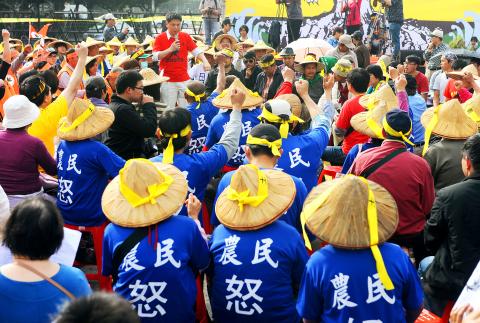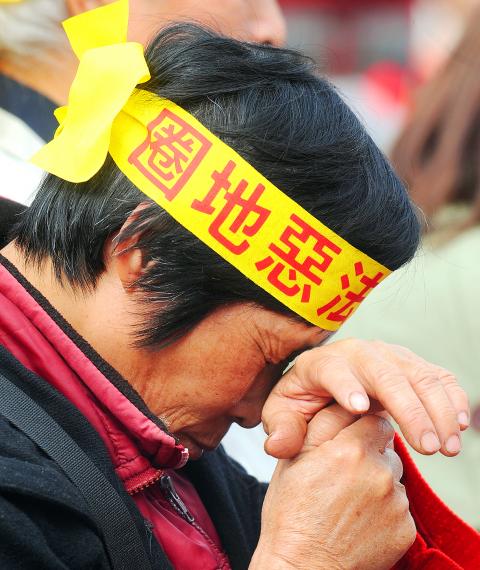|
Farmers, activists protest against
globalization
By Loa Iok-sin / Staff reporter

Farming rights advocates gather
on Ketagalan Boulevard in front of the Presidential Office yesterday to protest
against the globalization of the agricultural sector, warning that it could lead
to a further deepening of the food and climate crises. The text on the back of
the T-shirts reads: “Farmers are angry.”
Photo: Liao Chen-huei, Taipei Times

A woman rests her head on her
hands during a protest by farming rights advocates on Ketagalan Boulevard in
front of the Presidential Office in Taipei yesterday.
Photo: Liao Chen-huei, Taipei Times
Hundreds of people, including farmers and
farming activists from Taiwan, Thailand, Indonesia, South Korea, Japan and
Malaysia, yesterday rallied against the globalization of agriculture on
Ketagalan Boulevard in front of the Presidential Office, protesting against the
government’s plans to lift more bans on agricultral imports.
“We gather here today to express our anger, we want to tell the government that
we’re fed up with their compromises on our food sovereignty, it’s a serious
problem that our food self-sufficiency has dropped to 33 percent now,” Taiwan
Rural Front (TRF) spokeswoman Tsai Pei-hui (蔡培慧) told the crowd at the rally.
“You’ve put our dining tables and refrigerators in other people’s homes, we want
to keep them in our own places.”
In addition to a series of heated protests against land expropriations that have
been going on for years, farmers and farming activists are worried that the
government may soon lift the bans on imports of 830 categories of farm products
from China, as well as pork products from the US, despite President Ma Ying-jeou’s
(馬英九) repeated promises that he would not do so.
“During the presidential campaign, Ma promised numerous times that he would not
lift the bans on imports of 830 categories of farm products from China, but now,
Council of Agriculture Minister Chen Bao-ji (陳保基) is saying that the bans ‘may’
be lifted,” said National Cheng Chi University land economics professor Hsu
Shih-jung (徐世榮), a long-time advocate of farmers’ rights. “When the government
decided to lift the ban on imports of certain US beef products amid strong
opposition from the public, Ma also firmly promised that the imports of US pork
products would remain banned — yet the US government is now pressuring the Ma
administration to lift the ban.”
Hsu said farmers across the country now “have little confidence in this
incapable government” and therefore gathered to voice their opposition to free
trade in the agricultural sector and to call on the government to insist on
agricultural sovereignty.
Henry Saragih, the general coordinator of the Jakarta, Indonesia, office of
international small farmers’ organization La Via Campesina, said that the
problems that Taiwanese farmers encounter are the same for farmers across the
world.
La Via Campesina is an international coalition of peasants’ movements with 148
member groups in 69 countries around the world.
“Land grabbing, loss of food sovereignty and an increasing number of people
threatened by famine — now reaching more than 1 billion — are problems created
by the WTO, globalization and neo-liberalism,” Saragih said.
He said that Thailand, for instance, which originally had a diverse agricultural
sector, now specializes in producing rice for export, and has to import other
produce.
South Korea has become an exporter of electronic products, “and since most of
its farmland has been taken by the industrial sector, some South Korean
agricultural companies now grab land in Africa — especially Madagascar — to grow
produce to be imported back to South Korea, leaving Madagascan farmers
landless,” Saragih said.
Wirat Phromson, a member of the Northern Peasants’ Federation Thailand, urged
farmers in Taiwan to continue their struggle.
Citing the farming rights movement in Thailand, Phromson said that despite the
seeming flexibility of the Thai government and its promise to revise laws, “the
[Thai] government eventually amended laws concerning the agricultural sector,
but not for the interests of the peasants. Rather, it was for the interests of
big corporations.”
“We want to tell our brothers and sisters in Taiwan and in Via Campesina: Do not
believe those empty promises of the government,” he said. “We can’t let people
from outside take valuable resources from us and impose on us the sufferings of
hunger.”
Following performances by musicians in the evening, the rally ended with
protesters throwing bundles of straw toward the Presidential Office.
|
![]()
![]()
![]()